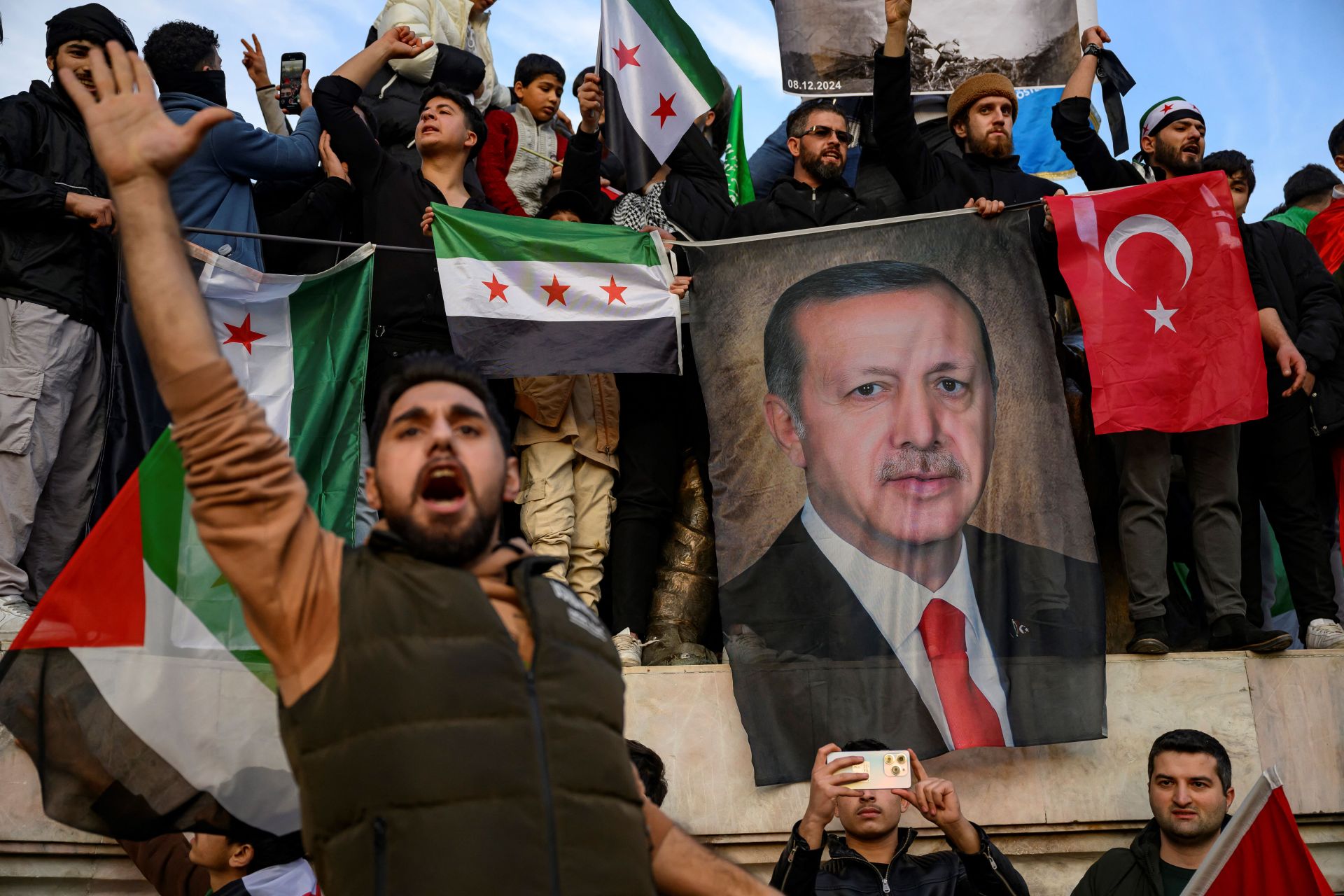- Home
- Middle East
- After Assad’s Fall, Erdogan Enjoys Moment ‘In the Sun'

People hold a banner featuring Turkish President Recep Tayyip Erdogan as members of the Syrian community and supporters gather to celebrate the fall of Syrian president Bashar al-Assad in the face of an offensive by Islamist-led rebels, in Istanbul on December 8, 2024. © Yasin AKGUL / AFP
After backing the rebels who overthrew Bashar al-Assad and brokering a key Horn of Africa peace deal, Turkey's Recep Tayyip Erdogan has boosted his international standing, leaving him well-placed to mediate between Russia and Ukraine, analysts say.
Although Turkey was not directly involved in the Syrian strongman's overthrow, it has long maintained a working relationship with the Islamist-led HTS rebels behind the push, leaving it with a direct line to Damascus as other governments fret over the group's Al-Qaeda roots.
Erdogan was jubilant as the rebels stormed Damascus, and just days later, his spy chief Ibrahim Kalin became the first high-profile figure to visit HTS leader Abu Mohammed al-Jolani, who now goes by his real name Ahmed al-Sharaa.
The same week, Erdogan scored another diplomatic coup by brokering the end of a bitter year-long dispute between Ethiopia and Somalia.
In another boost for Erdogan's international standing, Turkey's role in the Syria upheaval won praise on Monday from president-elect Donald Trump.
"I think Turkey is very smart... Turkey did an unfriendly takeover, without a lot of lives being lost," the billionaire businessman told reporters at his Florida residence.
'Maximising Turkey's leverage'
"Erdogan has played the long game from a power projection and security perspective," Anthony Skinner, director of research at Marlow Global, told AFP.
His government "has carefully cultivated relations with both state and non-state actors to maximise Turkey's leverage in its back yard and further afield," he said.
"The returns are particularly apparent in Syria and the Horn of Africa. Erdogan has played his cards well until now and he holds an enviable hand in Syria."
Just days later, Erdogan also offered to step in to resolve a dispute between Khartoum and Abu Dhabi over the brutal conflict gripping Sudan that has left tens of thousands dead.
For Max Abrahms, an international security professor and author of a book on terror group dynamics, "Erdogan has been a big winner" of the Syrian upheaval.
With Assad's long-term backers now out of the picture -- Russia mired in its war with Ukraine and Iran weakened by Israel's assault on Hezbollah -- the stage has been cleared for Erdogan to "expand Turkish influence in Syria", he told AFP.
Ankara confident
That will likely see Ankara moving to "mitigate the PKK threat as Turkey consolidates control along its border", he said of Turkish operations against Syrian Kurdish fighters.
Since 2016, Turkey has staged multiple operations in northern Syria, mainly targeting the YPG, which is a key part of the US-backed Syrian Democratic Forces (SDF).
But for Ankara, the YPG is linked to the PKK, its domestic nemesis which has fought a decades-long insurgency on Turkish soil.
Just days after Assad's fall, Ankara appeared confident its opposition to Kurdish militants would be adopted by its HTS allies who are now ruling Syria.
"In this new period, the PKK/YPG terrorist organisation will be eliminated in Syria... Both we and the new administration in Syria want this," Foreign Minister Hakan Fidan said on Friday.
What could also strengthen Turkey's hand would be a decision by the incoming Trump administration to withdraw US troops from Syria -- which would weaken the SDF "to the delight of Erdogan", Abrahms said.
Refugee relief
The Syria transition also unlocks another key concern for Ankara -- the fate of nearly three million refugees who found refuge in Turkey but whose presence has stoked increasing domestic tensions.
Assad's ouster now "paves the way for the return of refugees resident in Turkey and enhanced influence for Ankara in Syria", said Hamish Kinnear, senior analyst at Verisk Maplecroft.
Given Erdogan's growing role in the Middle East alongside his negotiating success with Ethiopia and Somalia, it "only reinforces the impression of growing Turkish geopolitical and diplomatic clout", he said.
That could enhance his chances of taking a negotiating role in other conflicts.
"Turkey is in theory well-placed to mediate between Ukraine and Russia, given its ability to speak to both Kyiv and Moscow," Maplecroft told AFP.
Since the war began in February 2022, Erdogan has carefully maintained ties with both sides, speaking to Vladimir Putin on the phone and shying away from Western sanctions on Moscow while supplying Ukraine with drones.
For Kinnear, with Turkey's role in Syria and its involvement in other diplomatic initiatives, "it is undoubtedly Erdogan's moment in the sun".
Fulya Ozerkan, with AFP
Read more



Comments